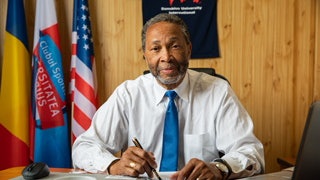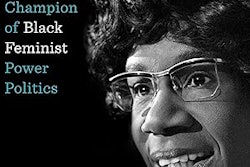As a recent truth-averse presidential administration was getting established in Washington, a prominent spokesperson announced that messaging to the public from its representatives would contain “alternative facts.” This contradictory phraseology was then followed by a torrent of intentional misrepresentations, deliberate distortions, calculated disinformation, and outright lies, and the impact of this malevolent strategy profoundly affected the foundational institutions of society, including the academy.
 Dr. William B. Harvey
Dr. William B. Harvey
Though some concern had simmered in conservative circles about CRT’s criticism of the status quo prior to the election of Donald Trump, it was his condemnation of the field at a White House event focused on the nation’s history that brought it into the national spotlight. CRT and its accompanying nemesis, The 1619 Project, Trump trumpeted were, “a crusade against American history and ideological poison that will destroy our country.” His public denunciation of CRT unleashed a bevy of critics who, notwithstanding that this field of study was applied in postgraduate settings, proceeded to vilify all forms of examination and analysis of racism and discrimination, from elementary school to doctoral study, as profoundly unAmerican.
In fact, CRT is a set of ideas holding that racial bias is inherent in many parts of Western society, especially in its legal and social institutions, on the basis they were primarily designed for, and implemented by, so-called white people. This interdisciplinary academic field is devoted to analyzing how laws, social and political forces, and media shape, and are shaped by, social conceptions of race and ethnicity. To its opponents though, CRT is dangerous because it is an articulation of the position and situation that Black Americans in particular, and Black people around the world, experience in white dominated societies.
Rather than presenting a principled challenge to the empirical validity or the pedagogical merit of CRT, its critics chose to distort its substance, meaning, and application by ascribing the term to any and all academic content or approaches that examine racial interactions in America. Thus, a caricature of CRT has been fronted as a clear and present danger in middle and high schools as well as in universities, which has led to a sustained attack by right-wing idealogues on certain books, African American studies courses, and even campus cultural centers that provided services to underrepresented students. But, the transparent efforts to undermine the legitimacy and salience of CRT have revealed that in this crusade, facts have taken a back seat to ideology. The endeavor to demonize a legitimate academic methodology and the use of alternative truths has consequently resulted in the creation of a false narrative that I have labeled Hypocritical Race Theory (HRT).
The advocates of HRT are many, as the doctrine requires no minimum level of education, expertise, or understanding of how American society has developed or how it functions at the present time. Its scope is broad enough to cover any situation that might take place in an academic setting and could cause a person of European ancestry to be made uncomfortable because of the mention of, or reference to, racism, discrimination, or white supremacy. Having such wide bandwidth means that HRC has been put into practice in a wide variety of circumstances, such as: defending and justifying slavery; declaring that African American Studies courses have no academic value; inverting the intent of Dr. Martin Luther King, Jr.’s message about not judging people by their color, but by their character; and distorting the meaning and purpose of the Black Lives Matter movement.
Clearly, there is no place for the presentation of alternative facts in the academy. Yet, the voices of the nation’s academic leadership have been surprisingly muted at the two-pronged attack that conservative forces have mounted. First, they undermined the principle of academic freedom through their attacks on an established area of research and scholarship. Then, they compromised inquiry and exploration in the classroom by proclaiming certain topics and issues to be inappropriate for discussion and analysis. The higher education community cannot succumb to this form of externally imposed, anti-intellectual, political manipulation that would push the society backward, rather than forward.
The adherents of HRT would countermand the academy’s inherent, solemn responsibility to disclose and disseminate actual, not alternative, facts. The chronology of racial interaction in America is an unfolding, complicated, and often painful story. The path to a brighter future in this crucial arena will not be reached by whitewashing the past.
Dr. William B. Harvey serves as Distinguished Scholar at the American Association for Access, Equity and Diversity in Washington, D.C.



















